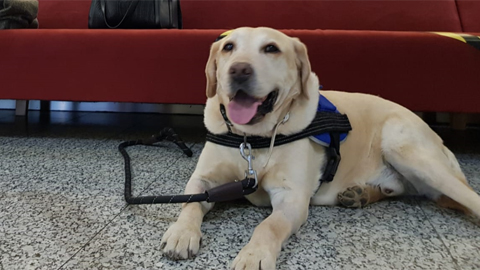Marga Macías, on biodetection dogs: "Studies are under way to enable them to detect the smell of Covid-19"

Marga Macías, coordinator of our school's specialisation courses in Canine Unit Instruction and Director of IDDT Group, was invited to the programme Estat de Gràcia, on Catalunya Ràdio, to talk about dogs' extraordinary sense of smell and how they are able to detect illnesses. She revealed that studies are being carried out to enable biodetection dogs to detect the smell of a Covid-19 infection.
26/02/2021
(Photo: Muga, keeping Marga Macías company on Catalunya Ràdio)
Marga Macías, coordinator of our school's course Basic Training and Canine Education and the graduate diplomas in Canine Unit Instruction and director of IDDT Group, was invited on Friday 19 February to the programme Estat de Gràcia on Catalunya Ràdio, to talk about the work of biodetection dogs trained to detect substances.
She explained that dogs have an extraordinary sense of smell, by which they can distinguish the smells of illnesses with proper training. We humans, for example, can detect the general smell of a pizza, but dogs can pick out the smell of the different types of cheese and other smells in the pizza.
It is important to select the dog carefully when carrying out detection tasks, and the environment and the substance to be detected must also be taken into consideration for optimal results.
Currently, several countries are investigating dogs' ability to detect the smell of Covid-19 and, in Macias's words: "we are working on a project in this area with the government of Andorra, the UAB Chair of Human Safety and Security, IDDT Group and the School of Prevention and Integral Safety and Security". A proof-of-concept trial is about to start, to see whether specialist biodetection dogs can detect the smell of a Coronavirus infection. Regrettably, "only 10% of dogs' capacities are being used to benefit human safety and security", she revealed.
Medical alert dogs are accredited under the Catalan law on assistance-dogs and are trained to detect illnesses and their effects, such as low blood sugar levels in diabetics. In the latter case, multidisciplinary teams (with doctors, vets, psychologists, etc.) determine the risk thresholds for suffering hypoglycaemia and use the corresponding blood samples to train the working dog to detect these levels.
Macías pointed out that these dogs are not only important for their sense of smell but also for their behaviour, as they know what to do if their owner has a medical issue.
Their training is based on play and rewards, with the focus on their emotions.
She ended by explaining the process by which assistance dogs are paired with their owners: first, the individual or family is interviewed, then a decision is taken on the type of dog needed, a dog is selected and training begins. Owner and dog are paired up during or after the training, together with the owner's family circle, so that they know how to behave towards the assistance dog.
You can listen to the recording of the interview, here.